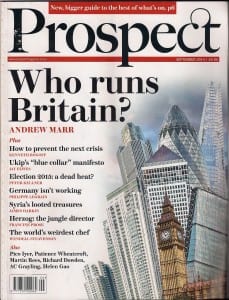 In the current edition of Prospect magazine, the BBC journalist, Andrew Marr dips into the debate about where the power lies in Britain today, with an imaginatively titled piece. Marr offers a tour de horizon of forthcoming political challenges including the independence referendum in Scotland, the general election and the possibility of a referendum on EU membership. He also notes a marked decline in trust in the political structures which are perhaps best placed to deal with these challenges. Recent revelations about the ‘incestuous’ relationship between politicians and the media, and about MPs’ expenses have it is often suggested resulted in widespread popular mistrust of politicians, which, coupled with declining membership of political parties, and falling electoral turnout, suggests a crisis in British democracy.
In the current edition of Prospect magazine, the BBC journalist, Andrew Marr dips into the debate about where the power lies in Britain today, with an imaginatively titled piece. Marr offers a tour de horizon of forthcoming political challenges including the independence referendum in Scotland, the general election and the possibility of a referendum on EU membership. He also notes a marked decline in trust in the political structures which are perhaps best placed to deal with these challenges. Recent revelations about the ‘incestuous’ relationship between politicians and the media, and about MPs’ expenses have it is often suggested resulted in widespread popular mistrust of politicians, which, coupled with declining membership of political parties, and falling electoral turnout, suggests a crisis in British democracy.
However, Marr suggests the real explanation for the declining trust in British political institutions is not so much the behaviour of those involved, as a longer term process of devolving power away from those institutions: ‘faith and engagement in the British political system has fallen to a damaging low because real power has moved away to the lords of money and the commissioners of the EU; and the electorate has started to notice.’ Power he suggests has ‘migrated to the City, and the big global corporations’ and to a lesser degree the European Union. Disentangling Britain from the latter is a simpler and more electorally attractive prospect, but is unlikely to see any real shift of power back to Westminster as long as global capital can continue to flout national regulations and tax regimes.
This argument about the hollowing out of the state is hardly new, and Marr himself observes that many of the recent developments have roots dating back more than twenty years. He does suggest, however, that there are some signs of hope. Whilst not underestimating the difficulties of reining in the power of global capital Marr does suggest that an international response might be possible (including through the EU), he also notes evidence of politicians fighting back in some corners of Westminster, most notably the Public Accounts Committee. Marr also points to a growth in support for independent and non-traditional parties as evidence of a ‘new politics’, and most significantly, he observes the forthcoming referendum in Scotland has generated ‘a better-informed and more vigorously active political debate than at any time in his lifetime’. Whether any of this will lead to substantive change, Marr states, is a question for another day, but his article suggests the answer to the question who runs Britain? is likely to be contested for many years to come.
